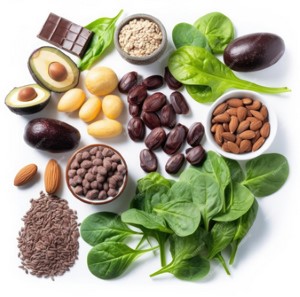Thinking about Magnesium
By Reed Mangels, PhD, RD
I was at a conference for dietitians when a speaker, extolling cow’s milk, said that 3 cups of cow’s milk provided 25% of the Recommended Dietary Allowance (RDA) for magnesium. Actually, the speaker just said “milk,” but it was understood that “milk” meant cow’s milk. Three cups of cow’s milk contain about 90 milligrams of magnesium. In addition to the fact that few adults will drink 3 cups of cow’s milk, the speaker neglected to mention the many plant sources of magnesium. Some of these vegan sources have more magnesium in a serving than is found in 3 cups of cow’s milk.
Magnesium is an essential mineral. We need to get it from food and/or supplements in order to stay healthy. Magnesium is important in many parts of our body including bones, muscles, nerves, and DNA. It also helps to control blood sugar levels and blood pressure.
The Recommended Dietary Allowance (RDA) for magnesium is:
Birth to 6 months: 30 milligrams/day (this is the Adequate Intake rather than the RDA)
7-12 months: 75 milligrams/day (this is the Adequate Intake rather than the RDA)
1-3 years: 80 milligrams/day
4-8 years: 130 milligrams per day
9-13 years: 240 milligrams/day
14-18 years: 410 milligrams/day (male); 360 milligrams/day (female)
19-30 years: 400 milligrams/day (male); 310 milligrams/day (female)
31 years and older : 420 milligrams/day (male); 320 milligrams/day (female)
Pregnancy: 400 milligrams/day (14-18 years); 350 milligrams/day (19-30 years); 360 milligrams/day (31 years and older)
Lactation: 360 milligrams/day (14-18 years); 310 milligrams/day (19-30 years); 320 milligrams (31 years and older)
Many whole plant foods supply us with magnesium.
10 Good Sources of Magnesium for Vegans
- Spinach, 156 milligrams of magnesium in 1 cup cooked
- Swiss chard, 124 milligrams of magnesium in 1 cup cooked
- Quinoa, 108 milligrams of magnesium in 1 cup cooked
- Pumpkin seeds, 99 milligrams of magnesium in 2 Tablespoons
- Almond butter, 89 milligrams of magnesium in 2 Tablespoons
- Soybeans, 78 milligrams of magnesium in ½ cup
- Brown rice, 76 milligrams of magnesium in 1 cup cooked
- Tempeh, 67 milligrams of magnesium in ½ cup
- Shredded Wheat cereal, 66 milligrams of magnesium in 1 cup
- Dark chocolate, 65 milligrams of magnesium in 1 ounce
Dietary fiber and substances found in plant food called phytates are known to decrease the amount of magnesium absorbed. Generally, however, vegan diets based on whole plant foods are high enough in magnesium to compensate for the possibility of a reduction in absorption.
To read more about magnesium see Magnesium Fact Sheet for Consumers (from National Institutes of Health; contains nonvegan sources of magnesium)

